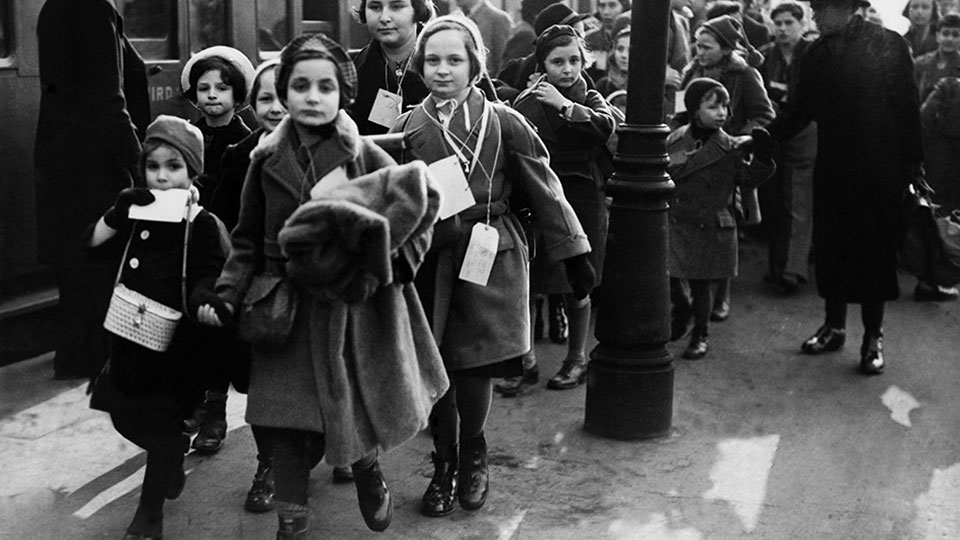Home › Forums › Cool S~~~ & Fun Stuff › Sir Nicholas Winton "Saving the Children" : Bio & Video.
This topic contains 0 replies, has 1 voice, and was last updated by ![]() Y_ 2 years, 8 months ago.
Y_ 2 years, 8 months ago.
- AuthorPosts
Sir Nicholas Winton, “Saving the Children”
May 19 1909 – July 1 2015
Sir Nicholas Winton, who passed away in 2015, aged 106, saved the lives of 669 children, most of them Jewish, from Nazi-occupied Czechoslovakia in 1939; but his achievement long went unrecognised and for 50 years few of the children knew their saviour’s name. He is dubbed the British Schindler for his work.
Sir Winton’s heroic wartime activity emerged in 1988 when the story, based on the contents of a scrapbook containing lists of the children and letters from their parents, was published in The Sunday Mirror. Winton had previously said little about his rescue mission.
Sir Nicholas Winton was born Nicholas Wertheim in West Hampstead on May 19 1909, the son of a businessman involved in importing Bohemian glassware. His paternal grandparents, who were German Jews, had settled in Britain in the 1860s. His mother had arrived from Germany in 1907. They changed their name to Winton in 1938.
Nicholas was baptised and brought up a Christian and, although he lost his faith, he was always ambivalent about his Jewish ancestry, feeling that too much conflict was caused by religions dwelling on their differences rather than on shared ethics.
“When I set out to try and bring children from Czechoslovakia,” he said later, “I didn’t do it because they were Jewish children. I did it because they were children.”
His role as “Britain’s Schindler” began shortly before Christmas 1938, when a skiing holiday he had been planning had fallen through and he was invited to visit Prague by a Left-wing schoolmaster friend, who suggested that Sir Winton join him in “a most interesting assignment”.
Prague at the time was home to most of the 118,000 Jews in the Czech-speaking area of Czechoslovakia, and the city was in the grip of a refugee crisis. Nazi troops had occupied the Sudetenland, and thousands of Jews from the region were pouring into Prague.
When Sir Winton arrived, British relief workers asked him to lend a hand. He found vast camps of refugees living in appalling conditions. He spent only a couple of months in Prague but became alarmed for the future of the children in the camps, for whom nothing seemed to be being done.
The pogroms of Kristallnacht, the “Night of Broken Glass,” had recently struck Jewish shops, homes and synagogues in Germany and Austria. War looked inevitable, and escape, especially for children, seemed hopeless, given the restrictions against Jewish immigration in the West.
Britain, however, was an exception. In late 1938, it began a program, called Kindertransport, to admit unaccompanied Jewish children up to age 17 if they had a host family, with the offer of a 50-pound warranty for an eventual return ticket.
The Refugee Children’s Movement in Britain sent representatives to Germany and Austria, and 10,000 Jewish children were saved before the war began. But there was no comparable mass-rescue effort in Czechoslovakia. Sir Winton created one.
On his own initiative, he set up an office at a dining-room table in his hotel in Wenceslas Square, and early in 1939 launched the Czech Kindertransport. It involved dangers, bribes, forgery, secret contacts with the Gestapo, nine railroad trains, an avalanche of paperwork and a lot of money. Nazi agents started following him.
In his Prague hotel room, he met terrified parents desperate to get their children to safety, although it meant surrendering them to strangers in a foreign land.
In three weeks, Sir Winton compiled a list of 6,000 children who would face almost certain death under the Nazis, and established a group of sympathisers to arrange their transportation from Czechoslovakia.
In early 1939, he left two friends, Trevor Chadwick and Bill Barazetti, in charge in Prague and returned to London to find foster homes, raise money and arrange transportation.
Back in London, Sir Winton worked by day at the Stock Exchange and at night returned to a small room in Hampstead that had become his operations centre.
He and a few volunteers, including his mother, calling themselves the British Committee for Refugees from Czechoslovakia, Children’s Section, enlisted aid from the Refugee Children’s Movement, had photos of the children printed and appealed for funds and foster homes in newspaper ads and church and synagogue bulletins.
Working as the British Committee for Refugees from Czechoslovakia and with the Czechoslovak travel agency Cedok, he arranged transport and lobbied western governments to accept the children. Only Britain and Sweden agreed, and then somewhat grudgingly.

For each child Sir Winton had to find a foster parent and a £50 guarantee, a lot of money in those days. He also had to raise money to help pay the travel costs when the children’s parents could not afford to pay.
“I appointed myself honorary secretary of the British Council for Refugees from Czechoslovakia and advertised for families in Picture Post,” Sir Winton recalled. “I wouldn’t say the council was very happy with its new arm, but there wasn’t much they could do about it. Eventually they gave me a small amount of funding, but not until it was really too late.”
Hundreds of British families volunteered to take children, and money trickled in from donors — not enough to cover all the costs, but Sir Winton made up the difference himself.
When the Nazis extended their control to the whole of Czechoslovakia in March 1939, Sir Winton became so desperate at Home Office delays in issuing entry papers that he resorted to forgery. He had appealed to the Home Office for entry visas, but the response was slow and time was short. “This was a few months before the war broke out,” he recalled. “So we forged the Home Office entry permits.
In Prague, Mr. Chadwick quietly cultivated the chief of the Gestapo, Karl Bömelburg — they called him “the criminal rat” after his inspector’s rank of kriminalrat — and arranged for forged transit papers and bribes to be passed to key Nazis and Czech railway officials, who threatened to halt trains or seize the children unless they were paid off. The Gestapo chief proved instrumental, clearing the trains and transit papers, Mr. Chadwick said.
Sir Winton sent more money, some for bribes and some to cover expenses for children whose parents had been arrested and shot or had fled into hiding, while many of the Czech families sold possessions to pay for their children’s escape. The red tape and paperwork seemed endless.
But on March 14, 1939, it all came together. Hours before Hitler dismembered the Czech provinces of Bohemia and Moravia as a German “Protectorate,” the first 20 children left Prague on a train. Survivors told of searing scenes on the station platform in the final moments before departure as children sobbed and pleaded not to be sent away and parents faced giving up their children.

Sir Winton and his colleagues later arranged for eight more trains to get the rest of the children out, crossing the Third Reich through Nuremberg and Cologne to the Hook of Holland, then across the North Sea by boat to Harwich, Essex, and on by British rail to the Liverpool Street Station in London. There, he and the host families met the children. Each refugee had a small bag and wore a name tag.
But only seven of the eight trains made it through, the last in early August, bringing the total rescued to 669. About 250 children, the largest group, were on board the last train out, on Sept. 3, 1939.
On that day, however, Hitler invaded Poland, all borders controlled by Germany were closed and Sir Winton’s rescue efforts came to an end.
The ninth train — the biggest transport — had been due to leave Prague on the day on which Britain entered the war. “Within hours of the announcement, the train disappeared,” Sir Winton recalled. “None of the 250 children on board was heard of again, which is an awful feeling.”
In the nine months of relentless campaigning, he and his small group of volunteers had arranged for 669 children to get out on eight trains from Prague to London (a small group of 15 were flown out via Sweden). As the exhausted children arrived at Liverpool Street station to be collected by their English foster parents, Sir Winton watched from a distance.

“Inside I was cheering like a football match, but outwardly I was calm and quiet,” he recalled. “I knew that for every Jewish child safely deposited on the platform that day, there were hundreds more still trapped in Czechoslovakia. And I knew that because I was organising this emigration entirely on my own, I wouldn’t be able to bring out a fraction of those in such terrible danger.”
The importance of the Kindertransports became clear after the war when it emerged that few of the children’s parents had survived.
Those who owed their lives to Sir Winton included the writer Vera Gissing (who went on to co-write Winton’s biography), Karel Reisz, the film-maker who directed The French Lieutenant’s Woman, Lord (Alf) Dubs, the Labour politician, and Dagmar Simova, cousin of the Czech-born former US Secretary of State Madeleine Albright.

- Sir Winton and some of his children at a reunion.
You can read his full biography in the citation list
Forgotten Heroes

Doreen Warriner
The key figure in the rescue of refugees from Czechoslovakia was Doreen Warriner, a young academic from University College London, who arrived in Prague in October 1938, soon after Munich, to provide assistance for those who had fled there from the German-occupied Sudetenland and, if possible, to bring them to safety.
Warriner was mainly concerned with political refugees, especially anti-Nazis from the Sudetenland, mostly Social Democrats under the leadership of Wenzel Jaksch; she did not focus on Jews, though many of the people she rescued were Jewish, and she did not focus on children, though in bringing out the families of anti-Nazis she also saved children’s lives.
It was Warriner who underpinned the rescue organisation in Prague. She established and headed up the office on Voršilská Street, where the other rescuers, including Winton, worked, and where the trains that took refugees across the border to Poland were organised; and she recommended Winton to the BCRC, thus making it possible for him to create his children’s section of the BCRC when he returned to London.
Warriner stayed in Prague until April 1939, when it became too dangerous for her. She had been smuggling anti-Nazis illegally across the border into Poland, and the Gestapo were about to arrest her. The number of people Warriner saved ran into the thousands.
One of her most memorable exploits was, with two helpers, to guide two groups of endangered women and children from Prague’s railway stations to safe accommodation in cheap hotels and hostels, and this on the day after the German army entered Prague, when the streets were filled with German military units.
Trevor Chadwick
Winton left Prague on 21 January 1939 and could play no part in the organisation of the refugee transports at the Czech end. Fortunately, a replacement was at hand, in the person of Trevor Chadwick, a teacher at a school in Swanage, Dorset, who had come to Prague to bring two refugee boys to places at the school.
In the event, they also took a third child – Chadwick’s mother provided the guarantee – and she became the poet Gerda Mayer, whose lines grace, among other publications, the book that accompanied the AJR’s exhibition Continental Britons (2002).
Chadwick delivered the three children, then returned to Prague to work for the rescue of further refugees. According to the recently published and very informative book by his son, William Chadwick, The Rescue of the Prague Refugees 1938/39 (Leicester: Matador, 2010), he had thousands of refugees on his lists, but to his abiding regret could ‘only’ save hundreds.
Chadwick made the organisational arrangements in Prague for the children whose entry to Britain had been secured by Winton in London. Working with Warriner, he was involved in the selection of the children to emigrate and in the organisation of the trains that took them to Britain.
It was he who stood on the platform at Wilson Station.
Warriner and Chadwick both died in the 1970’s. This tribute is intended to help to bring the role they played in the rescue of the children from Czechoslovakia to public attention. It is certainly not intended to detract in any way from the achievements of Nicholas Winton.
Recognition and Closure
This is the ’60 minutes’ TV programme interview of Winton’s work and the surprise reunion with some of ‘his children’ (run time 15min)
The publicity led to Sir Winton’s being showered with honours.
In Czechoslovakia he was awarded the Freedom of the City of Prague in 1991, and in October 1998 Vaclav Havel, President of the Czech Republic, awarded him the Order of TG Marsaryk in a ceremony in Hradcany Castle.
In 2001, at President Havel’s invitation, Sir Winton returned to Prague for the premiere of The Power of Good, a Czech-produced documentary about his story. In October 2014 he received the Order of the White Lion from President Milos Zeman in a ceremony at Prague Castle.
In Britain Winton received, in 1999, the freedom of the city of Windsor, an honour he shared only with members of the Royal family; and he was knighted in 2003.
When a biography, Nicholas Sir Winton and the Rescued Generation by Vera Gissing and Muriel Emanuel, was published in 2001, he said: “It was only nine months out of my 92 years and yet this book makes it seem it was my whole life.”
In 2014 his daughter Barbara Winton published an account:
If it’s Not Impossible… The Life of Sir Nicholas Winton.Sir Nicholas Winton is survived by a son and a daughter. His wife Grete Winton died in 1999.

Citations
http://www.telegraph.co.uk/news/obituaries/11711344/Sir-Nicholas-Winton-humanitarian-obituary.html
http://www.nicholaswinton.com/WintonsList/children.htm
http://www.powerofgood.net/
https://www.nytimes.com/2015/07/02/world/europe/nicholas-winton-is-dead-at-106-saved-children-from-the-holocaust.html?_r=0
http://www.ajr.org.uk/index.cfm/section.journal/issue.Apr11/article=7782- AuthorPosts
You must be logged in to reply to this topic.

921526
921524
919244
916783
915526
915524
915354
915129
914037
909862
908811
908810
908500
908465
908464
908300
907963
907895
907477
902002
901301
901106
901105
901104
901024
901017
900393
900392
900391
900390
899038
898980
896844
896798
896797
895983
895850
895848
893740
893036
891671
891670
891336
891017
890865
889894
889741
889058
888157
887960
887768
886321
886306
885519
884948
883951
881340
881339
880491
878671
878351
877678













